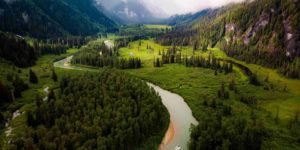
With the 2024 British Columbia election now underway, several key ridings in the Interior of the province, including in the Okanagan, the Kootenays, and northern British Columbia look to play pivotal roles in determining the overall outcome.
These regions are historically less urbanized, with a mix of rural and resource-based economies, making them more politically diverse. The B.C. New Democratic Party (NDP), the resurgent B.C. Conservative Party, and a handful of high-profile Independents, including former B.C. United MLAs, are all vying for influence.
The B.C. Conservative Party, under leader John Rustad, is expected to make significant gains, particularly in the more conservative and rural areas of the province.
The party has capitalized on growing discontent with both the B.C. NDP government and the now virtually defunct B.C. United.
With Rustad steering the party towards a platform that resonates with socially conservative and populist voters, the B.C. Conservatives could emerge as the dominant opposition in the northern and Interior ridings.
In regions like the Okanagan and the Kootenays, where small-c conservative values have a strong foothold, the B.C. Conservatives are expected to gain traction.
Here we go!!! #bcpoli pic.twitter.com/qYpnKPT5IT
— Mike Bernier (@Mike_A_Bernier) September 21, 2024
In ridings such as Peace River North and Peace River South, long-time former B.C. United MLAs Dan Davies and Mike Bernier, respectively, are now running as Independents.
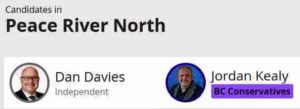
To read Vote Mate candidate profiles of the Peace River North candidates, click here.
These ridings, which have traditionally voted conservative, will see fierce competition between these Independents, and the B.C. Conservative candidates.
If the vote splits between Independent conservatives and the B.C. Conservatives, it could allow the B.C. NDP to secure an unexpected victory — if they were running a candidate in either riding, which as of this writing they most decidedly are not. The B.C. NDP must figure it’s a lost cause.
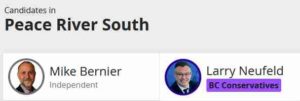
To read Vote Mate candidate profiles of the Peace River South candidates, click here.
As we say above, former B.C. United MLAs running as Independents could significantly impact the political dynamics in their respective ridings.
I’m officially running for re-election as MLA for Prince George-North Cariboo as an independent! I’ve heard loud and clear that we need a voice that reflects our values and offers a centrist option in this important election.
As an independent MLA, I will fight for the same… pic.twitter.com/0bIWqUsUIE— Coralee Oakes (@coraleeoakes) September 21, 2024
These candidates carry local recognition and established track records, but the collapse of B.C. United has left a vacuum that both the B.C. Conservatives and NDP are seeking to fill. The presence of high-profile Independent candidates, such as Bernier in Peace River South, Dan Davies in Peace River North, Coralee Oakes in Cariboo North, and Tom Shypitka in Kootenay-Rockies, could lead to a fragmentation of the right-leaning vote.
Mike Bernier, for example, has deep roots in Peace River South, and his decision to run as an Independent is likely to retain a significant portion of his previous support. However, he faces competition from a growing B.C. Conservative presence in the area. Similarly, Coralee Oakes in Cariboo North may siphon votes away from the B.C. Conservative candidate, potentially paving the way for a closer contest with the B.C. NDP.
Before we leave the North, let’s take a look at …
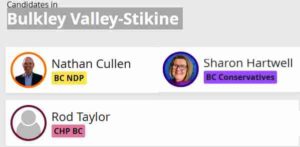
Bulkley Valley-Stikine. The Stikine has been in the NDP column since 2009 with Doug Donaldson. Prior to 2009, Bulkley Valley-Stikine had been held by Dennis McKay of the B.C. Liberals. It’s the smallest riding in the province by population, and the largest by geography. The NDP’s Nathan Cullen is the MLA for the riding, which he won handily in 2020, following a 15-year stint as the shadow Finance Critic for the federal New Democratic Party. As was the case in 2020, Rod Taylor, the head of the Christian Heritage Party, is running again; generally, he receives about 10% of the vote. Although not announced as of this writing, word is that the B.C. Greens will run an Indigenous candidate who has been active in the anti-pipeline movement. Stir that all around, and Bulkley Valley-Stikine could very well turn into a horse race. One to keep an eye on.

Skeena. Pair this riding with Bulkley Valley-Stikine and this could be a pick up for the NDP, now that Ellis Ross — who had held the riding for B.C. United — has jumped to the federal Conservatives, where he’ll run as a federal candidate in the Skeena riding. Sarah Zimmerman who has deep roots in Skeena, and currently sits as an elected Terrace City Councillor and was the former Executive Director of Communications for Coast Mountain College is considered to be a very strong candidate in the riding. Expect David Eby to spend time in both ridings, to secure two victories in the North.
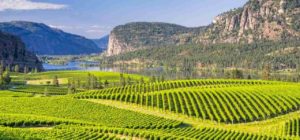
In the Okanagan, where former B.C. United candidates Ashley Ramsay (Kelowna-Mission), Dr. Michael Humer (Kelowna Centre), Tracy St. Claire (Penticton-Summerland), and Kevin Acton (Vernon-Lumby) are now running as Independents, the political landscape is equally complicated.
New ad! pic.twitter.com/zHy0XNPOO2
— Kevin Acton (@votekevinacton) September 19, 2024
The Okanagan is traditionally conservative, but the vote-splitting between Independents and B.C. Conservative candidates could offer opportunities for the NDP, particularly in historically competitive ridings such as Vernon-Lumby, which the NDP won in 2020. Acton’s candidacy will face pressure from both the B.C. NDP and a surging B.C. Conservative base. If the vote splits, it could swing the riding back into NDP control, or allow the B.C. Conservatives to make gains.
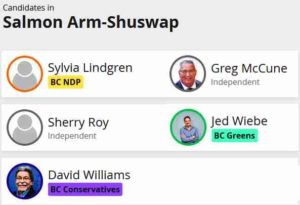
To read Vote Mate candidate profiles of the Salmon Arm-Shuswap candidates, click here.
In Salmon Arm-Shuswap, Greg McCune’s Independent bid will face similar dynamics. This riding has a deeply conservative base, but with B.C. Conservatives gaining momentum, vote-splitting could alter the outcome.
The Kootenay Ridings: NDP vs. B.C. Conservatives
In the Kootenays, the B.C. NDP has traditionally done well, especially in ridings like Kootenay West and Kootenay-Rockies, where progressive and environmentally-focused voters dominate. However, the B.C. Conservatives are working to broaden their appeal in these areas by emphasizing opposition to government overreach, particularly on resource management and rural development issues.
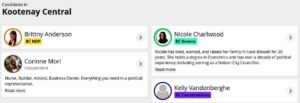
To read Vote Mate candidate profiles of the Kootenay-Central candidates, click here.
The B.C. Greens have historically been a strong force in Nelson and surrounding areas, appealing to environmentally conscious voters who support sustainable resource management and climate action. In ridings like Kootenay-West (the old Nelson-Creston riding) the Greens are expected to remain a key player, with potential to siphon votes away from the B.C. NDP. However, it is unlikely that the B.C. Conservatives will gain significant traction here due to the progressive nature of the electorate.
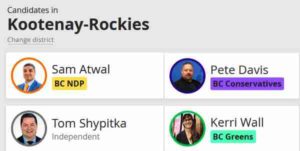
To read Vote Mate candidate profiles of the Kootenay-Rockies candidates, click here.
In Kootenay-Rockies, Tom Shypitka’s decision to run as an Independent, having previously been a B.C. United MLA, will complicate the conservative vote. The B.C. Conservatives are likely to perform well in this region, but Shypitka’s local popularity could create a fragmented right-leaning vote, giving the NDP a chance to maintain or even expand their influence.
The Kamloops Ridings
Kamloops has historically been a battleground, with ridings like Kamloops-North Thompson and Kamloops-Centre frequently seeing close contests.
The B.C. Conservatives, emboldened by their recent growth, are aiming to make headway in these ridings.
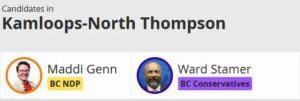 To read Vote Mate candidate profiles of the Kamloops-North Thompson candidates, click here.
To read Vote Mate candidate profiles of the Kamloops-North Thompson candidates, click here.
In Kamloops-North Thompson, where rural concerns about resource industries and housing affordability dominate, the B.C. Conservatives are expected to perform well, potentially at the expense of the B.C. NDP.
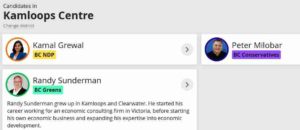
To read Vote Mate candidate profiles of the Kamloops-Centre candidates, click here.
Kamloops-Centre, with a more urban electorate the Conservatives could retain the seat with former B.C. United / B.C. Liberal candidate Peter Milobar holding down the fort for the Conservatives, unless voters disillusioned with both the remnants of B.C. United. and decide to cast their ballot for a reinvigorated B.C. New Democratic Party.
The 2024 B.C. election in the Interior, Okanagan, Kootenays, and the North is shaping up to be one of the most competitive in recent history.
The B.C. Conservatives are positioned to make significant gains, particularly in more rural, conservative-leaning ridings. However, the presence of high-profile Independents, especially former B.C. United MLAs, adds complexity to the race, creating the potential for vote-splitting and unexpected outcomes.
The B.C. Greens will remain strong in progressive enclaves, particularly around Nelson, while the B.C. NDP faces the challenge of defending its gains from 2020 in the face of a re-energized conservative movement.
As of today, we are 25 days away from October 19th Election Day.
2024 British Columbia Provincial Election | Regional Riding Analysis

Part 1 | Vancouver Island | Five Ridings in Contention, and Subject to Change
The Hotel Pacifico podcast will broadcast daily, Monday thru Friday, throughout the 2024 election
The good folks at Air Quotes Media’s Hotel Pacifico podcast — featuring Mike McDonald, Christy Clark’s campaign manager in 2013; Geoff Meggs, Premier John Horgan’s Chief of Staff; and Kate Hammer, a former Globe and Mail British Columbia legislative reporter — will “broadcast” on the B.C. Election each day, Monday through Friday.
VanRamblings will post the podcast, for your edification and enjoyment.
